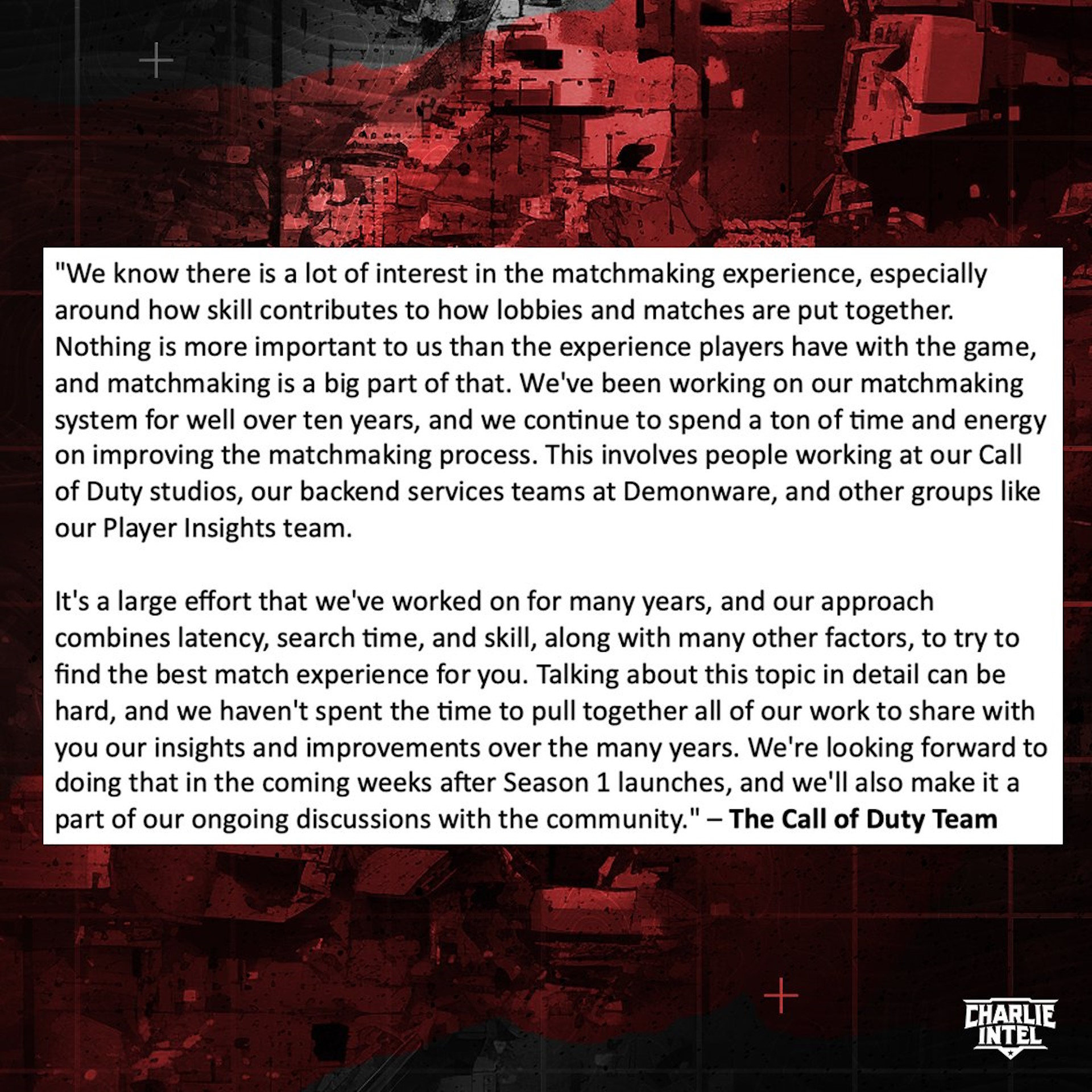Breaking with tradition, Activision says it will actually start talking about Call of Duty skill-based matchmaking soon
The mysteries of SBMM—in Call of Duty, at least—may soon stand revealed.

Skill-based matchmaking is a lot like magnets: How do they work? Nobody really knows outside developers themselves, and historically game makers have been reluctant to talk very much about it. But in a statement shared with Charlie Intel, Activision said it's finally going to start offering some real insights into its processes for Call of Duty matchmaking after the launch of Modern Warfare 3 Season 1 in December.
You can get a good sense of the confusion surrounding SBMM in our 2021 look at matchmaking in Call of Duty: Warzone: Officially, the word from Activision was that Warzone doesn't use SBMM at all because of its high player count, but despite that we said "there is good evidence that Warzone does indeed match players based on skill."
Two years later, we know it's in there, but there's still no clarity on how it works—perhaps for good reason, as Morgan Park recently wrote, because everyone has their own ideas about how it should work: "There's no pleasing everybody, especially when some want fairness by way of skill ratings and others want fairness via an amorphous illusion of randomness."
But Activision may be getting tired of that particular song and dance, because it's now committed to shining a light on the process. "We've been working on our matchmaking system for well over 10 years, and we continue to spend a ton of time and energy on improving the matchmaking process," it told Charlie Intel. "This involves people working at our Call of Duty studios, our backend services team at Demonware, and other groups like our Player Insights team.
"It's a large effort that we've worked on for many years, and our approach combines latency, search time, and skill, along with many other factors, to try to find the best match experience for you. Talking about this topic in detail can be hard, and we haven't spent the time to pull together all of our work to share with you our insights and improvements over the many years. We're looking forward to doing that in the coming weeks after Season 1 launches, and we'll also make it a part of our ongoing discussions with the community."

An Activision spokesperson confirmed that the statement came out of a "live conversation from Call of Duty reps at an event, and accurately describes what was said."
It's a potentially risky move on Activision's part. One reason developers have given for obfuscating SBMM parameters in the past is to mitigate those who'd attempt to game the system to climb the ranks. We'll have to wait to see what sort of insights we get into the process, but assuming it offers up something of meaningful depth, it'll be genuinely interesting to get a look at how it all works, and it might prompt developers of other competitive shooters to do the same.
Keep up to date with the most important stories and the best deals, as picked by the PC Gamer team.
But there's also a chance that it could backfire with some members of the community: As Morgan said, you can't please everyone, and there will no doubt be some people who figure Activision is doing it all wrong—not enough to impact the fortunes of the game, I'm sure, but enough to cause a few extra headaches for community managers.
Call of Duty: Modern Warfare 3 Season 1 launches on December 6.

Andy has been gaming on PCs from the very beginning, starting as a youngster with text adventures and primitive action games on a cassette-based TRS80. From there he graduated to the glory days of Sierra Online adventures and Microprose sims, ran a local BBS, learned how to build PCs, and developed a longstanding love of RPGs, immersive sims, and shooters. He began writing videogame news in 2007 for The Escapist and somehow managed to avoid getting fired until 2014, when he joined the storied ranks of PC Gamer. He covers all aspects of the industry, from new game announcements and patch notes to legal disputes, Twitch beefs, esports, and Henry Cavill. Lots of Henry Cavill.

